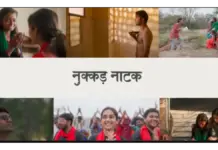Abhishek Agarwal Arts LLP and I Am Buddha Entertainment’s The Bengal Files (A) is about the horrendous pre-Independence (1946) chapter of Calcutta, in which thousands of innocent Hindus were brutally murdered by the minority community, in what came to be known as the Direct Action Day.
CBI officer Shiva Pandit (Darshan Kumar) is sent to Murshidabad to investigate the disappearance of a Dalit girl, Gita Mandal. Once there, he meets an old lady, Bharati Banerjee (Pallavi Joshi), who, perhaps, knows who has abducted Gita. However, as the probe begins, Shiva Pandit realises that the story is not just about Gita Mandal but dates back to 1946 when thousands of innocent Hindus in Calcutta were butchered by the minority community, a genocide that accelerated the division of the country into India and Pakistan.
Vivek Ranjan Agnihotri’s story is well-researched but it appears too scattered to be digested by the audience universally. His screenplay tries to pack in too much. Consequently, the drama fails to have the desired impact on the audience. Chilling scenes, which ought to have shaken the viewers and moved them to tears, fail to do so and probably just shock them — which is not enough for a drama of this kind. For the audience to feel invested in the proceedings, it ought to have shaken them emotionally, but that doesn’t happen most of the times. Frankly, the scenes don’t look very real and, therefore, the drama doesn’t appear seamless. Most of the principal characters talk so much and get into such details that the impact gets considerably diluted. Like brevity is the soul of wit, it is also the soul of hit (film). Besides, since the drama covers the incidents of 1946, 1947 and of the current times, it gets too much for the viewers to understand. Of course, the Hindu genocide of 1946 has tremendous shock value, but the rest of the drama is so long-drawn and often boring that the overall impact of the genocide is also compromised. Vivek Ranjan Agnihotri’s dialogues are very good at places but not consistently so.
Darshan Kumar does a fine job as CBI officer Shiva Pandit. Pallavi Joshi is extraordinary, especially in the last part of the film, in the role of Bharati Banerjee aged more than 100 years. Simrat Kaur acts supremely naturally as young Bharati Banerjee. Saswata Chatterjee is first-rate as Sardar Husseini. Mithun Chakraborty plays the mute and impotent Chatur pretty effectively, but since he enacts the role of a person whose tongue has been cut, his dialogues are often incomprehensible. The director should have taken care of the same because his dialogues are often lost on the audience. Eklavya Sood is alright as Amar. Anupam Kher performs ably in the role of Mahatma Gandhi. Namashi Chakraborty makes his presence felt as Ghulam Husseini. Puneet Issar performs well as CBI chief. Priyanshu Chatterjee has his moments as Justice Banerjee. Rajesh Khera is effective as Jinnah. Anubha Arora makes her mark as Gauri. Ajitabh Sengupta (as Murshidabad police inspector Javed Khan), Shubhankar Das (as Murshidabad head constable Salim Ali) and Joydeep Mukherjee (as Murshidabad police constable Uttam Kumar) shine wonderfully. Kundan Roy (as Sardar Husseini’s man, Shibhuprasad Hazra) and Ananybrata (as Sardar Husseini’s man, Shaqib Bengali) are superb. Dibyendu Bhattacharya is nice as Rajendralal Roychowdhary. Mohan Kapur makes his mark as Huseyn Shaheed Suhrawardy. Saurav Das plays Gopal Patha well. Madalsa Sharma Chakraborty leaves a fine impression as Sardar Husseini’s wife. Hanish Kaushal lends good support as Taimur. Ruma Mondal is natural as Bharati Banerjee’s mother. Rumi Jaffery (as Agha Jaleel Kashmiri), Dibanisha Banerjee (as Gita Mandal), Digvijay Purohit (as Jawaharlal Nehru), Manoj Tiwari (as J.B. Kripalani), Raj Kanani (as Mujib-ur-Rehman), and the others are adequate.
Vivek Ranjan Agnihotri’s direction is good as far as technique is concerned, but he has not been able to engage the audience’s attention consistently because the subject is scattered between two time periods — pre-independence years of 1946 and 1947, and decades later. The research is excellent but the horrifying scenes of the genocide repulse the audience (as they must) more than emotionally moving them (as they also should have). Besides, the drama is so long-drawn that it often gets boring and dry. Music — mostly popular traditional songs — is very melodious. Rohit Sharma’s background music is impactful. Attar Singh Saini’s cinematography is excellent. Paramjeet Singh Dhillon’s action and stunt scenes are excellently choreographed and are realistic. Rajat Poddar’s production designing, and art direction (by Alankar Yashawant, Minakshi Shinde and Chanchal Bisht) are good for the present times but ought to have been better for the parts devoted to the period drama. Shankh Rajadhyaksha’s editing leaves something to be desired.
On the whole, The Bengal Files is a well-researched film but its box-office potential seems to be bleak.
Released on 5-9-’25 at Inox (daily 3 shows) and other cinemas of Bombay thru Zee Studios. Publicity: fair. Opening: dull. …….Also released all over. Opening was weak almost everywhere.




























